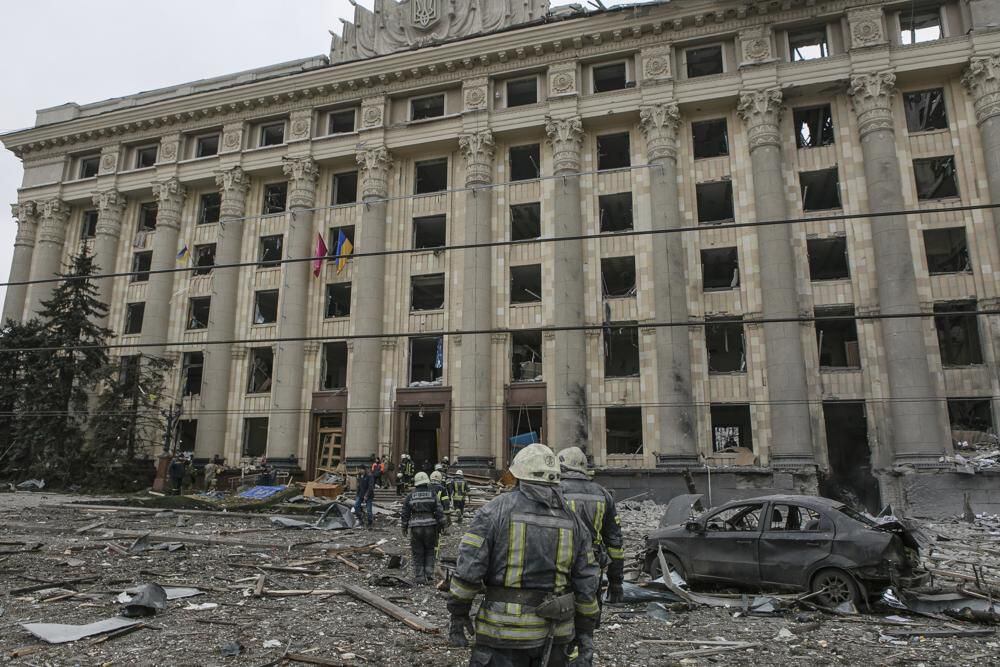
The prosecutor of the International Criminal Court (ICC) indicated that he had opened an investigation into the situation in Ukraine, evoking “war crimes” and “crimes against humanity”, after Kiev accused Russia before the International Court of Justice (ICJ) of plan a genocide.
Here are five questions about the legal situation after the invasion.
Did Russia break international law?
Russia violated Article 2(4) of the United Nations Charter, which prohibits the use of force at the international level, says Geoff Gordon, a senior fellow at the Hague-based Asser Institute for International and European Law.
“The use of Russian military force is not unknown” in Ukraine, added Philippe Sands, a professor of international law who works in the United Kingdom.
But “today there are rules to protect us from such acts, reflected in the UN Charter, the closest thing we have to an international Constitution,” Sands warns in an article in the Financial Times.
“It is the most important commitments of the Charter that (Vladimir) Putin has underestimated,” he says.
Which courts can try Ukraine-related matters?
Ukraine appeared before the ICJ (International Court of Justice), which will undoubtedly hold hearings to determine its legal competence in this case, says Gordon.
In addition, national courts can also try cases related to violations of international law, it adds.
Russia may also have to appear before the European Court of Human Rights, accused by Kiev of violations in that area.
Ukraine is not a signatory to the Rome Statute, the founding treaty of the ICC, however, in 2014 it formally recognized its jurisdiction with respect to crimes committed on its territory.
Russia, for its part, has withdrawn from the ICC, which is why it cannot prosecute Russian citizens on Russian soil, but only if they are detained on the territory of a state that does recognize its jurisdiction.
Can individuals be held liable?
Yes. The ICC prosecutes those accused of the worst atrocities committed in the world, which includes genocide, war crimes and crimes against humanity.
Individuals can also be prosecuted by national courts.
However, even the ICC cannot judge the crime of aggression — the attack by one state against another planned by a political or military leader — if that country has not ratified the Rome Statute, which is the case with Russia and Ukraine.
However, Sands suggested creating an international (‘ad hoc’) criminal court devoted to Russian aggression against Ukraine.
What’s next?
The ICJ, which handles disputes between countries, will first determine whether it has jurisdiction to deal with the merits of this case.
According to Cecily Rose, assistant professor of public international law at the University of Leiden (Holland), the hearings and the decision of the ICJ could take place in the coming weeks, even earlier due to “urgency”.
As for the ICC, it could issue indictments if the magistrates determine that it has sufficient jurisdiction and evidence, or if a member state brings the case directly to that court.
What effects will it have?
Difficult to predict, according to experts.
The ICJ, whose sentences are final and unappealable, “does not have a classic application mechanism” to enforce them, Gordon points out.
For its part, the ICC does not have its own police force and relies on member states to arrest people.
“On the other hand, we are witnessing the mobilization of a series of more or less coordinated mechanisms, whose objective is to punish Russia for waging an illegal war”, such as economic sanctions, travel restrictions and the cancellation of sporting events, says Gordon. “An ICJ ruling could play a role in such actions in the future,” he estimates.
Source: Gestion
Ricardo is a renowned author and journalist, known for his exceptional writing on top-news stories. He currently works as a writer at the 247 News Agency, where he is known for his ability to deliver breaking news and insightful analysis on the most pressing issues of the day.












